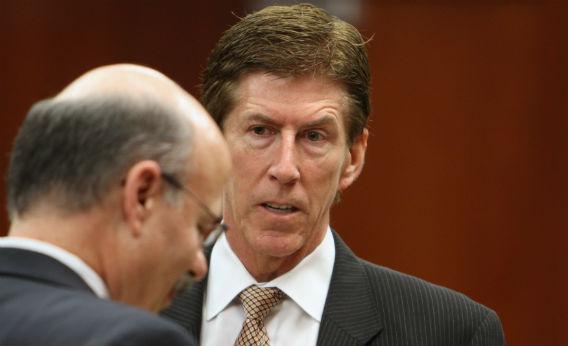George Zimmerman, charged with second-degree murder for the killing of Trayvon Martin, is shutting down his old social media accounts. (Not helpful: The 2005 MySpace page where he wrote “I dont miss driving around scared to hit mexicans walkin on the side of the street, soft ass wanna be thugs messin with peoples cars.”) Zimmerman isn’t going dark online, however. Instead, his defense lawyer, Mark O’Mara, started up a new Web page for his client this week, with Facebook and Twitter accounts to go with it.
O’Mara noticed that Zimmerman had raised $204,000 from a website he started in April, and the new page will raise money, too. More interestingly, O’Mara said that social media will be his tool for responding quickly and efficiently to “misinformation” about his client and the case. If his strategy works, O’Mara will be the Sarah Palin of defense lawyers: The guy who changed the legal publicity game via the Twitter and Facebook blast.
What differentiates O’Mara from the politicians, though, is that lawyers have an uneasy relationship with publicity in general and pretrial publicity in particular. High-profile attorneys, of course, use the press. But the rules for the bar prevent them from making public statements that are likely to prejudice a legal proceeding. What does that mean? The pat answer is that lawyers aren’t supposed to taint the jury pool by trying a case in public before they do it in the courtroom.
In cases like Zimmerman’s, though, the media will serve up endless coverage whether O’Mara stays silent or goes on TV every day. (The prosecutor in the case announced the charges against Zimmerman in a nationally televised press conference while the screen behind her flashed adorable pictures from Trayvon Martin’s childhood.) The defense is responding to the coverage, not driving it. O’Mara gets this. He used the new website to put out a statement about the 2005 MySpace page when that story broke, instead of calling a press conference or talking to a reporter. This is the part that’s Palin-esque. As ethics guru and New York University law professor Stephen Gillers puts it, “Before the Web, defense lawyers played whack a mole trying to counter not only the adverse publicity leaked by law enforcement (not necessarily the prosecutor), but the stories reporters find on their own.” O’Mara even uses social media to beat back the criticism of his use of social media. When @roblesherald tweeted this week, “O’Mara hints that if Crump criticizes #Zimmerman’s Myspace, Trayvon’s tweets will be fair game,” referring to Martin’s lawyer, Benjamin Crump, O’Mara tweeted back “ONLY in court. Not publicly.”
I asked Gillers to take a look at the Zimmerman website and social media presence, and he emailed back, “There’s no problem with the vehicle. It depends on what’s said, and the site appears to recognize the limits imposed by rules forbidding certain public comments by lawyers associated with a case. I did not see anything untoward on it. O’Mara has to monitor the contents. He can’t delegate that duty. But it seems he knows the boundaries.”
Scrolling through the comments, it’s clear that O’Mara or someone in his office is doing a lot of moderating. In the first hours after the site launched, a few commenters with fake names (it’s always the anonymous trolls) wrote disparagingly about Martin’s family, according to the Miami Herald. It’s smart for O’Mara to delete anything that makes his client look bad. It’s also an extra precaution, since the rules for the Florida bar instruct lawyers not to “assist” other people making a prejudicial statement.
The larger question O’Mara’s strategy raises is about what kind of statements really could prejudice the proceedings in a case like this. There has been so much publicity—an endless stream feeding a bottomless appetite. What could O’Mara, or the prosecutor, or anyone say at this point that would taint the jury pool any more than it has been tainted? And when we use that word, what do we really have in mind—a jury that knows nothing about the facts of the case before trial? That has always seemed wrong to me. Just as judicial impartiality doesn’t depend on judges being blank slates, I’d argue that jurors can have some background about a case and still decide it fairly.
In the major Supreme Court decision about pretrial publicity, Gentile v. State Bar of Nevada, decided in 1991, Justice Anthony Kennedy wrote, “Empirical research suggests that in the few instances when jurors have been exposed to extensive and prejudicial publicity, they are able to disregard it and base their verdict upon the evidence presented in court.” Gillers reminded me of the notorious 1991 trial of William Kennedy Smith, charged with raping a woman he met at a bar in Florida. Before trial, the state’s open records law made widely public unproven allegations, by three other women, that Smith had raped them, or tried to, in the 1980s. The women hadn’t reported these accusations to the police at the time. The judge ruled their testimony inadmissible at trial—and Smith was acquitted. Maybe we should give juries more credit for separating pretrial bedlam from evidenced presented in court. Then we could worry less about the bedlam, on and off the Web.
